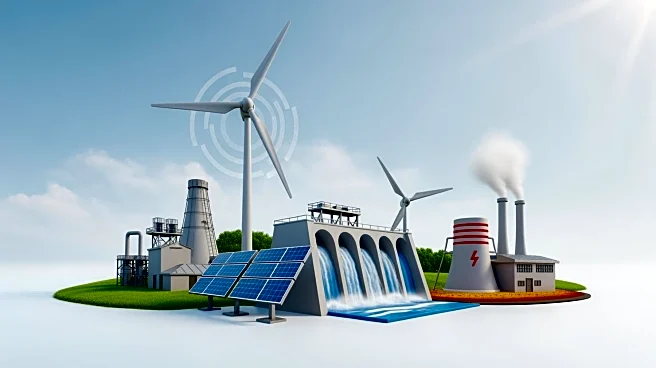What's Happening?
ISO New England has commenced a transitional cluster study involving 26 interconnection requests, totaling approximately 8 GW of summer-rated capacity. The study includes 21 battery energy storage projects, two solar projects, and three wind projects, primarily
located in Massachusetts. This initiative is part of a new framework designed to address interconnection queue backlogs by prioritizing non-speculative projects. The largest project in the study is SouthCoast Wind 1, with a capacity of 1,200 MW, selected by Massachusetts and Rhode Island in a coordinated procurement effort. The study aims to implement a 'first-ready, first-served' process, grouping interconnection requests for collective analysis.
Why It's Important?
The launch of the cluster study by ISO New England is a significant step towards streamlining the interconnection process for renewable energy projects. By prioritizing projects that are ready for development, the initiative seeks to reduce delays and improve efficiency in integrating new energy sources into the grid. This approach could accelerate the deployment of renewable energy, contributing to regional and national goals for clean energy transition. The study's focus on battery storage projects highlights the growing importance of energy storage in balancing supply and demand and enhancing grid reliability.
What's Next?
The transitional cluster study is expected to be completed by August 2026, with the first full cluster study request window opening in October 2026. Developers involved in the study must meet increased financial and site control requirements, facing penalties for withdrawing projects. ISO New England and transmission owners will also face penalties for delays in future studies. The outcomes of this study could influence future regulatory frameworks and investment strategies in the renewable energy sector.
Beyond the Headlines
The cluster study reflects broader trends in energy policy, emphasizing the need for efficient interconnection processes to support the growth of renewable energy. It underscores the role of regulatory bodies like the Federal Energy Regulatory Commission in shaping energy infrastructure development. The study's focus on battery storage projects highlights the evolving landscape of energy technology and the critical role of storage solutions in achieving energy sustainability.

















